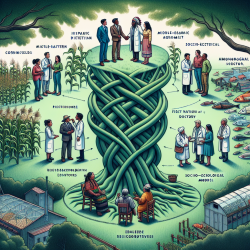The complex interplay between cultural identity, historical trauma, and food security among Indigenous populations is a critical area of study for practitioners working within these communities. The research article "Exploring First Nation Elder Women's Relationships with Food from Social, Ecological, and Historical Perspectives" provides valuable insights that can significantly enhance practitioner skills and approaches.
Understanding the Socio-Ecological Model
The Socio-Ecological Model (SEM) offers a comprehensive framework for understanding the multiple levels of influence on health behaviors. For practitioners, this model emphasizes the importance of considering not just individual behaviors but also the broader social, ecological, and historical contexts that shape these behaviors. By integrating SEM into practice, professionals can better address the root causes of food insecurity and health disparities among Indigenous populations.
The Impact of Historical Trauma
The legacy of residential schools has left deep scars on Indigenous communities. The intergenerational trauma experienced by First Nation Elder women is a poignant reminder of the ongoing effects of colonization. Practitioners must recognize these historical contexts when developing interventions aimed at improving food security and health outcomes. Understanding these experiences allows for more empathetic and culturally sensitive interactions with Indigenous clients.
Cultural Loss and Food Insecurity
The research highlights how cultural loss resulting from displacement and social disconnection contributes to food insecurity among Indigenous women. Practitioners should focus on restoring cultural practices related to food procurement and sharing as part of their interventions. Encouraging the revival of traditional food practices can empower communities and improve nutritional outcomes.
Practical Applications for Practitioners
- Cultural Competency Training: Engage in training that enhances understanding of Indigenous histories and cultural practices related to food.
- Community-Based Approaches: Collaborate with local Indigenous organizations to support community-driven initiatives that promote traditional food practices.
- Policy Advocacy: Advocate for policies that recognize the unique challenges faced by Indigenous communities in accessing traditional foods.
- Sustainable Practices: Encourage sustainable food systems that align with traditional ecological knowledge.
The Path Forward
This research underscores the importance of integrating an understanding of socio-ecological factors into practice. By acknowledging the historical traumas and cultural losses experienced by Indigenous communities, practitioners can develop more effective strategies to combat food insecurity and promote health equity.










